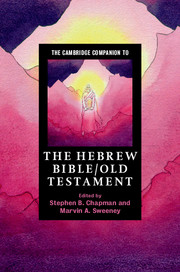Book contents
- Frontmatter
- Contents
- List of Tables, Maps, and Figures
- List of Contributors
- List of Abbreviations
- Introduction
- Part I Text and canon
- Part II Historical background
- Part III Methods and approaches
- Part IV Subcollections and genres
- Part V Reception and use
- 18 The Hebrew Bible in Judaism
- 19 The Old Testament in Christianity
- 20 The Hebrew Bible in Islam
- 21 The Hebrew Bible in art and literature
- 22 The Old Testament in public: the Ten Commandments, evolution, and Sabbath closing laws
- 23 The Theology of the Hebrew Bible/Old Testament
- Index
- Cambridge Companions to Religion (continued from page iii)
- References
20 - The Hebrew Bible in Islam
from Part V - Reception and use
Published online by Cambridge University Press: 05 July 2016
- Frontmatter
- Contents
- List of Tables, Maps, and Figures
- List of Contributors
- List of Abbreviations
- Introduction
- Part I Text and canon
- Part II Historical background
- Part III Methods and approaches
- Part IV Subcollections and genres
- Part V Reception and use
- 18 The Hebrew Bible in Judaism
- 19 The Old Testament in Christianity
- 20 The Hebrew Bible in Islam
- 21 The Hebrew Bible in art and literature
- 22 The Old Testament in public: the Ten Commandments, evolution, and Sabbath closing laws
- 23 The Theology of the Hebrew Bible/Old Testament
- Index
- Cambridge Companions to Religion (continued from page iii)
- References
Summary
The earliest Islamic creed preserved in the Qur'an states that Muslims ‘believe in God, His angels, His scriptures, and His messengers’ and that Muslims should make ‘no distinction among any of His messengers’ (Q. 2:285). The formulation of this creed has much to do with the introduction of monotheism to Arabia. Although neither scripture nor prophecy was given credence as a paradigm of human interaction with the gods by the pre-Islamic Arabs, they were to become essential elements of the new faith. Thus, much energy and time are devoted in the Qur'an to defending the existence of divinely revealed scriptures and the office of prophecy. This terse creed is used also in polemical retorts with the Jews and Christians who were telling Muslims to ‘become Jews or Christians, and you will be rightly guided’. The Muslims are asked to say, ‘No, ours is the religion of Abraham, the upright, who did not worship any god besides God. So say: “We believe in God and in what was sent down to us and what was sent down to Abraham, Ishmael, Isaac, Jacob and the Tribes, and what was given to Moses, Jesus, and all the prophets by their Lord. We make no distinction between any of them, and we devote ourselves to Him”’ (Q. 2:135–136). The creed asks Muslims to uphold the truth of the Scripture of Judaism but sees in that commitment no barrier to accepting the Qur'an as Scripture of the same status.
As a matter of faith, then, Muslims are supposed to believe that God sent revelation to humanity. The most important examples given in the Qur'an of such revealed Scriptures are the Torah of Moses (tawrāt), the Gospels of Jesus (injīl, here the Qur'an gives to Jesus what he never claimed to have), and the Psalms of David (zābūr). Many of the arguments in the Qur'an use the existence of these models as evidence for the divine origins of the new Scripture being revealed to the Arabs. Indeed, the nature of the Qur'an as Scripture is understood in the self-presentation of the Qur'an to be the same as that of the Torah and the Gospels.
Attempting to characterise the position of the Qur'an towards the Hebrew Bible is anything but simple.
- Type
- Chapter
- Information
- The Cambridge Companion to the Hebrew Bible/Old Testament , pp. 407 - 425Publisher: Cambridge University PressPrint publication year: 2016



